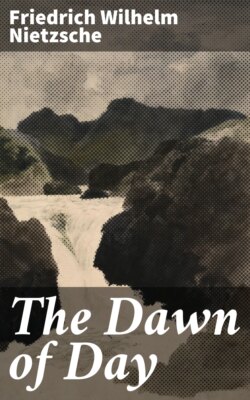Читать книгу The Dawn of Day - Friedrich Wilhelm Nietzsche - Страница 28
На сайте Литреса книга снята с продажи.
18.
ОглавлениеTable of Contents
The Morality of Voluntary Suffering.—What is the highest enjoyment for men living in a state of war in a small community, the existence of which is continually threatened, and the morality of which is the strictest possible? i.e. for souls which are vigorous, vindictive, malicious, full of suspicion, ready to face the direst events, hardened by privation and morality? The enjoyment of cruelty: just as, in such souls and in such circumstances, it would be regarded as a virtue to be ingenious and insatiable in cruelty. Such a community would [pg 025] find its delight in performing cruel deeds, casting aside, for once, the gloom of constant anxiety and precaution. Cruelty is one of the most ancient enjoyments at their festivities. As a consequence it is believed that the gods likewise are pleased by the sight of cruelty and rejoice at it—and in this way the belief is spread that voluntary suffering, self-chosen martyrdom, has a high signification and value of its own. In the community custom gradually brings about a practice in conformity with this belief: henceforward people become more suspicious of all exuberant well-being, and more confident as they find themselves in a state of great pain; they think that the gods may be unfavourable to them on account of happiness, and favourable on account of pain—not compassionate! For compassion is looked upon with contempt, and unworthy of a strong and awe-inspiring soul—but agreeable to them, because the sight of human suffering put these gods into good humour and makes them feel powerful, and a cruel mind revels in the sensation of power. It was thus that the “most moral man” of the community was considered as such by virtue of his frequent suffering, privation, laborious existence, and cruel mortification—not, to repeat it again and again, as a means of discipline or self-control or a desire for individual happiness—but a a virtue which renders the evil gods well-disposed towards the community, a virtue which continually wafts up to them the odour of an expiatory sacrifice. All those intellectual leaders of the nations who reached the point of being able to stir up the sluggish though [pg 026] prolific mire of their customs had to possess this factor of voluntary martyrdom as well as insanity in order to obtain belief—especially, and above all, as is always the case, belief in themselves! The more their minds followed new paths, and were consequently tormented by pricks of conscience, the more cruelly they battled against their own flesh, their own desires, and their own health—as if they were offering the gods a compensation in pleasure, lest these gods should wax wroth at the neglect of ancient customs and the setting up of new aims.
Let no one be too hasty in thinking that we have now entirely freed ourselves from such a logic of feeling! Let the most heroic souls among us question themselves on this very point. The least step forward in the domain of free thought and individual life has been achieved in all ages to the accompaniment of physical and intellectual tortures: and not only the mere step forward, no! but every form of movement and change has rendered necessary innumerable martyrs, throughout the entire course of thousands of years which sought their paths and laid down their foundation-stones, years, however, which we do not think of when we speak about “world-history,” that ridiculously small division of mankind's existence. And even in this so-called world-history, which in the main is merely a great deal of noise about the latest novelties, there is no more important theme than the old, old tragedy of the martyrs who tried to move the mire. Nothing has been more dearly bought than the minute portion of human reason and feeling of liberty upon which we now pride ourselves. But [pg 027] it is this very pride which makes it almost impossible for us to-day to be conscious of that enormous lapse of time, preceding the period of “world-history” when “morality of custom” held the field, and to consider this lapse of time as the real and decisive epoch that established the character of mankind: an epoch when suffering was considered as a virtue, cruelty as a virtue, hypocrisy as a virtue, revenge as a virtue, and the denial of the reason as a virtue, whereas, on the other hand, well-being was regarded as a danger, longing for knowledge as a danger, peace as a danger, compassion as a danger: an epoch when being pitied was looked upon as an insult, work as an insult, madness as a divine attribute, and every kind of change as immoral and pregnant with ruin! You imagine that all this has changed, and that humanity must likewise have changed its character? Oh, ye poor psychologists, learn to know yourselves better!
